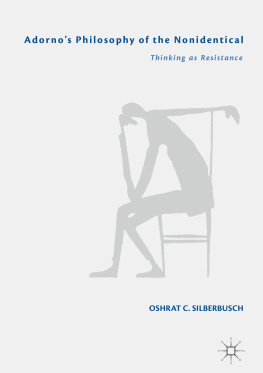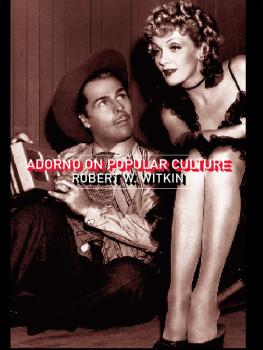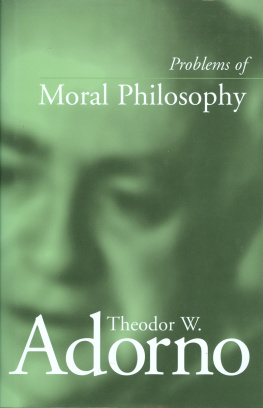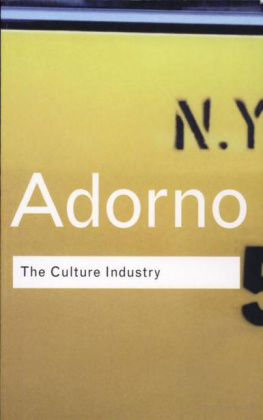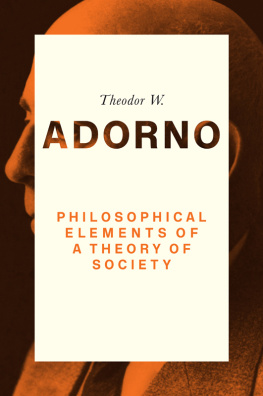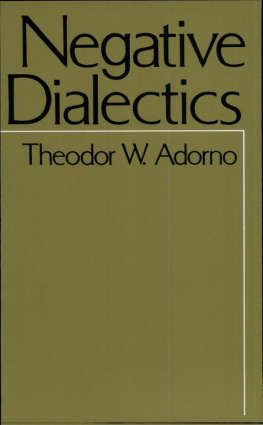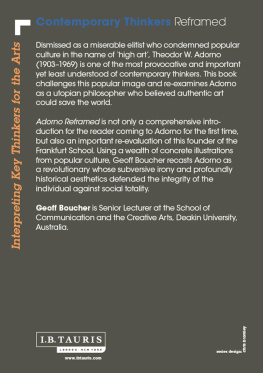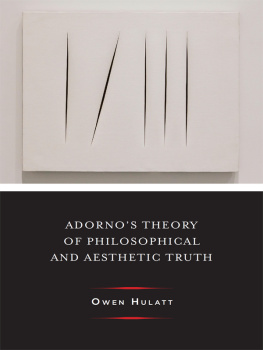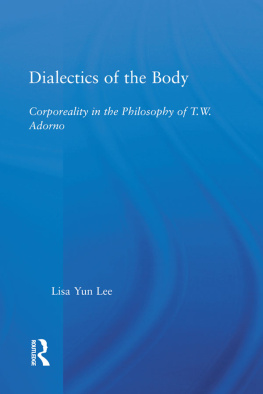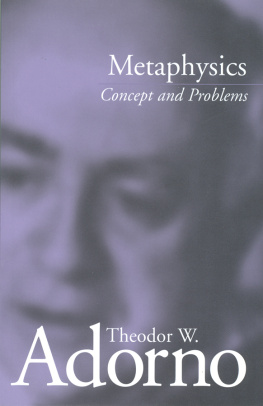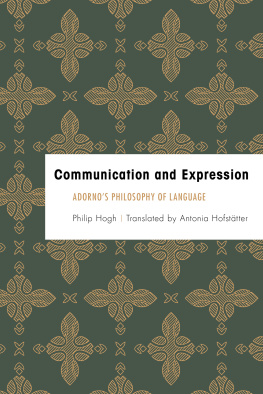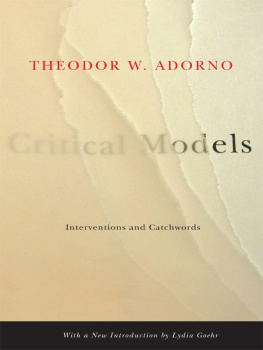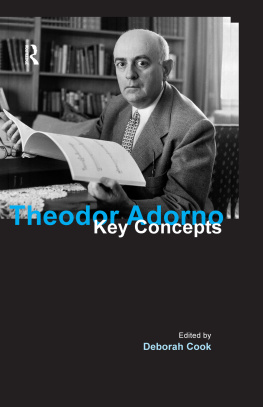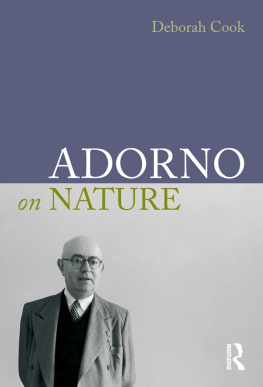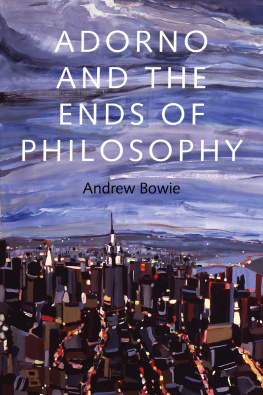Adorno Theodor W. - Adornos philosophy of the nonidentical: thinking as resistance
Here you can read online Adorno Theodor W. - Adornos philosophy of the nonidentical: thinking as resistance full text of the book (entire story) in english for free. Download pdf and epub, get meaning, cover and reviews about this ebook. City: Cham;Switzerland, year: 2018, publisher: Springer International Publishing;Palgrave Macmillan, genre: Religion. Description of the work, (preface) as well as reviews are available. Best literature library LitArk.com created for fans of good reading and offers a wide selection of genres:
Romance novel
Science fiction
Adventure
Detective
Science
History
Home and family
Prose
Art
Politics
Computer
Non-fiction
Religion
Business
Children
Humor
Choose a favorite category and find really read worthwhile books. Enjoy immersion in the world of imagination, feel the emotions of the characters or learn something new for yourself, make an fascinating discovery.
- Book:Adornos philosophy of the nonidentical: thinking as resistance
- Author:
- Publisher:Springer International Publishing;Palgrave Macmillan
- Genre:
- Year:2018
- City:Cham;Switzerland
- Rating:4 / 5
- Favourites:Add to favourites
- Your mark:
- 80
- 1
- 2
- 3
- 4
- 5
Adornos philosophy of the nonidentical: thinking as resistance: summary, description and annotation
We offer to read an annotation, description, summary or preface (depends on what the author of the book "Adornos philosophy of the nonidentical: thinking as resistance" wrote himself). If you haven't found the necessary information about the book — write in the comments, we will try to find it.
Adorno Theodor W.: author's other books
Who wrote Adornos philosophy of the nonidentical: thinking as resistance? Find out the surname, the name of the author of the book and a list of all author's works by series.
Adornos philosophy of the nonidentical: thinking as resistance — read online for free the complete book (whole text) full work
Below is the text of the book, divided by pages. System saving the place of the last page read, allows you to conveniently read the book "Adornos philosophy of the nonidentical: thinking as resistance" online for free, without having to search again every time where you left off. Put a bookmark, and you can go to the page where you finished reading at any time.
Font size:
Interval:
Bookmark:
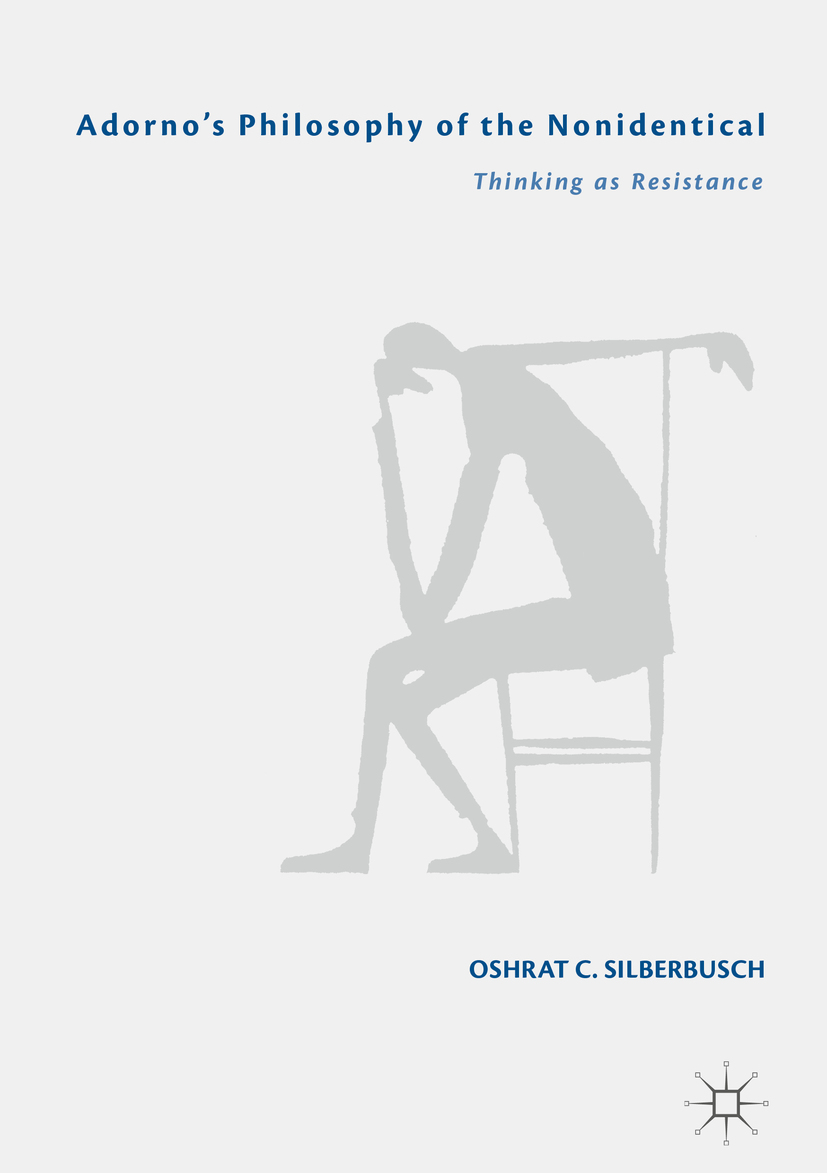

Cover image: Der Denker by Franz Kafka, courtesy of Paul Fearn / Alamy Stock Photo
This Palgrave Macmillan imprint is published by the registered company Springer Nature Switzerland AG
The registered company address is: Gewerbestrasse 11, 6330 Cham, Switzerland
To my children
S., M. and T.
I would like to thank all those who helped bring this book to completion.
My gratitude goes to Ron Margolin and Moshe Zuckerman for their tireless support of this project in its dissertation phase.
Thank you to the readers who read different versions along the way, for their encouragement, advice and criticism: Stefanie Baumann, Jay Bernstein, Philippe Farah, Elisha Mallard, Gerhard Scheit, David Sclar.
To my editor Phil Getz, for his support throughout the publication process, and for his patience in seeing it to the end.
And to my husband Daniel, for being my first reader and most enthusiastic supporter, for believing in this book long before I did, for bringing in the bread so I could write, and for everything else.
sthetik (1958/59) . Frankfurt am Main: Suhrkamp 2009. English Translation: Aesthetics , trans. Wieland Hobarn. Medford: Polity 2018.
AETsthetische Theorie . GS 7. English Translation: Aesthetic Theory , trans. R. Hullot-Kentor. New York: Continuum 1997.
DADialektik der Aufklrung (with Max Horkheimer). GS 3. English translation: Dialectic of Enlightenment , trans. E. Jephcott. Stanford University 2002.
DSHDrei Studien zu Hegel. GS 5, 248381. English translation: Hegel. Three Studies , trans. Shierry Weber Nicholsen (Cambridge: MIT Press 1993)
JEJargon der Eigentlichkeit . GS 6. English translation: The Jargon of Authenticity , trans. Knut Tarnowski and Frederic Will. Evanston: Northwestern University 1973.
KRVKants Kritik der reinen Vernunft . English translation: Kants Critique of Pure Reason , trans. R. Livingstone. Stanford University Press 2001.
LGFZur Lehre von der Geschichte und von der Freiheit . Frankfurt am Main: Suhrkamp 2006. English translation: History and Freedom , trans. Rodney Livingstone. Malden: Polity 2006.
MMMinima Moralia . GS 4. English translation: Minima Moralia , trans. E. Jephcott. New York: Verso 2005.
MPMetaphysik: Begriff und Probleme . Frankfurt am Main: Suhrkamp, 1998. English translation: Metaphysics. Concept and Problems , trans. E. Jephcott. Stanford University Press 2000.
NDNegative Dialektik . GS 6. English translation: Negative Dialectics , trans. E. B. Ashton. London: Routledge 1973.
PMPProbleme der Moralphilosophie . Frankfurt am Main: Suhrkamp, 1996. English translation: Problems of Moral Philosophy , trans. Rodney Livingstone. Stanford University Press 2001.
PTPhilosophische Terminologie . 2 vols. Frankfurt am Main: Suhrkamp 1973.
VNDVorlesung ber Negative Dialektik . Frankfurt a. M.: Suhrkamp 2003. English translation: Lectures on Negative Dialectics , trans. Rodney Livingstone. Malden: Polity 2008
These abbreviations are used in the body of the text for citations of Adornos book-length works and posthumously published lectures. References for Adornos essays are given in the footnotes. For the German edition of the writings published during Adornos lifetime, I cite Theodor W. Adorno, Gesammelte Schriften , 20 vols. (Frankfurt am Main: Suhrkamp 1984), henceforth GS followed by the volume number. The posthumous works are listed separately. Citations are of the format German/English (where applicable).
For the sake of consistency, and in a deliberate effort to remain as close as possible to Adornos writing, I use my own translations from the German throughout this book. The English page numbers refer to the corresponding passage in the published translations and are given for reference.
The only true thoughts are those that dont understand themselves, Adorno writes in Minima Moralia. The sentence stands on its owna monogram, Adorno calls itwithout any context that would help illuminate its paradoxical meaning. That Adorno believed truth to be something not easily possessed is hardly surprising, The elusiveness of truth, the fact that truth is a process rather than an end, that truth has a temporal corethese are all central tenets of Adornos thinking. But to get to the heart of this aphorism, we have to go a step further and ask why, according to Adorno, truth is out of our reachor more precisely, incomprehensible. Why do true thoughts not understand themselves? And conversely, why are thoughts that understand themselves not true? For Adorno, the answer has to do with the nature of reason and the fundamental structure of our understanding, and it is closely linked to that elusive other that lies at the very heart of his philosophy: the nonidentical. The relationship of reason to the world is fundamentally conceptualconnected to expression and thus to concepts: to grasp something, we name it. The problem is that we have a limited number of names at our disposal, for an unlimited number of phenomena. Reason solves this conundrum by subsuming the infinite richness of our world under a finite number of concepts, in other words, by pretending that what is different is in fact the same. It identifies the unique phenomenon as a specimen of a category and forces it into the Procrustean bed of conceptuality, treating the unknown as long known, the singular as an instance. This identity thinking, as Adorno calls it, allows us to form thoughts and makes intersubjective communication possible, but it comes at a price: the elimination of the nonidentical, that which is unique and therefore inexpressible. Adorno called the nonidentical the concepts other (DSH 5:363/133), the ungrasped, the incomprehensible (DSH 5:375/147). The nonidentical is that part of the truth that we, quite literally, cannot comprehend, that which slips between the cracks of our conceptual rationality, the unsayable and unsaid that prevents us from having a complete grasp of the world around us and makes all the thoughts that we
Font size:
Interval:
Bookmark:
Similar books «Adornos philosophy of the nonidentical: thinking as resistance»
Look at similar books to Adornos philosophy of the nonidentical: thinking as resistance. We have selected literature similar in name and meaning in the hope of providing readers with more options to find new, interesting, not yet read works.
Discussion, reviews of the book Adornos philosophy of the nonidentical: thinking as resistance and just readers' own opinions. Leave your comments, write what you think about the work, its meaning or the main characters. Specify what exactly you liked and what you didn't like, and why you think so.

